

Brexit case 'of fundamental constitutional importance' The need for Parliament to give its approval before the Brexit process starts is of huge "constitutional importance", the High Court has heard.
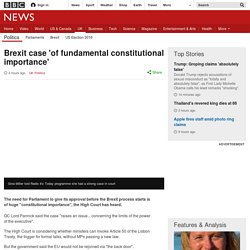
QC Lord Pannick said the case "raises an issue... concerning the limits of the power of the executive". The High Court is considering whether ministers can invoke Article 50 of the Lisbon Treaty, the trigger for formal talks, without MPs passing a new law. But the government said the EU would not be rejoined via "the back door". Tory MPs accuse May of 'tyranny' as vote on Brexit terms ruled out. Theresa May has been accused of tyranny and lack of respect for democracy by some of her own MPs over the government’s refusal to give parliament a say on the terms of leaving the EU.
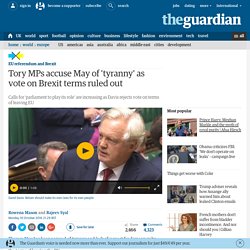
A string of Conservatives were critical of the government’s Brexit strategy in a House of Commons debate on Monday, with some asking for more details about the government’s negotiating plan and others calling for a greater say on the way the UK will leave the EU. The Guardian understands a group of several Tory MPs is even thinking of joining a legal suit due to be heard this week, which will challenge the government’s right to start taking the UK out of the EU without the consent of MPs.
A source close to the group said they believe that the high court case brought by activists, headed by the legal firm Mishcon de Reya, was based on sound legal argument. Brexit: What are the options? Image copyright AFP/Getty Theresa May is due to set out more details of her approach to the UK's departure from the EU.
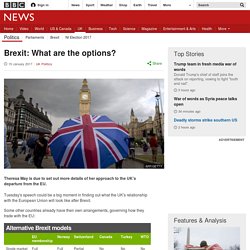
Tuesday's speech could be a big moment in finding out what the UK's relationship with the European Union will look like after Brexit. Some other countries already have their own arrangements, governing how they trade with the EU: But what does all this mean? Here's a guide to some of the terms and key debates that we're likely to be be hearing about. Alastair Campbell: New Labour helped sow seeds of Brexit vote. Alastair Campbell has admitted that his newly published diaries show clearly how New Labour sowed the seeds of the UK’s vote to leave the European Union by failing to respond to growing concerns over immigration.
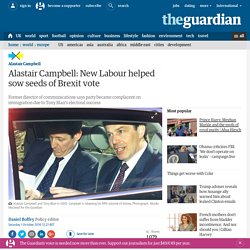
The former Downing Street director of communications said he feared the party became complacent on the issue due to Tony Blair’s electoral success, allowing the debate to shift in favour of a pro-Brexit vote in the EU referendum years later. The diaries, covering between 2003-2005, also reveal the then chancellor Gordon Brown had growing concerns that Labour had not done enough to change opinions, complaining that Blair was helping the Tories under Michael Howard to turn immigration into an electoral issue. Daily and Sunday Politics manifesto tracker: Constitution. The UK's EU referendum: All you need to know. Here is an easy-to-understand guide to Brexit - beginning with the basics, then a look at the negotiations, followed by a selection of answers to questions we've been sent.
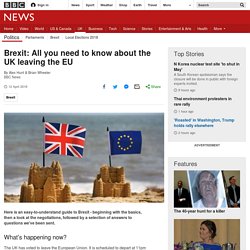
What's happening now? The UK has voted to leave the European Union. It is scheduled to depart at 11pm UK time on Friday 29 March, 2019. Brexit: Radical change needed to save UK, Carwyn Jones says. Image copyright Getty/BBC The way power is shared in the UK needs to change radically to ensure the union survives "new tensions" created by Brexit, First Minister Carwyn Jones has said in a speech in Chicago.
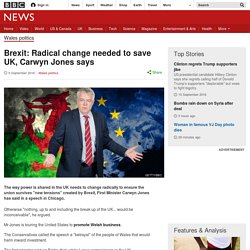
Otherwise "nothing, up to and including the break up of the UK... would be inconceivable", he argued. Mr Jones is touring the United States to promote Welsh business. The Conservatives called the speech a "betrayal" of the people of Wales that would harm inward investment. What is the EU and how does it work? Constitutional reform. The Tory plan to scrap the Human Rights Act just moved one step closer. The Government will publish its plans to replace the Human Rights Act in the autumn of this year, ministers have announced.

Asked in the House of Commons when the detailed plan for the Government’s “British Bill of Rights” would be made public, Dominic Raab said it would be available soon. “We will bring forward proposals on a bill of rights this autumn, they will be subject to full consultation. The preparation is going well,” the justice minister said. Mr Raab said the bill would give the UK Supreme Court supremacy over the European Court of Human Rights and give “a greater respect for the legislative role for honourable member sin this place” – referring to MPs. Should we repeal the Human Rights Act? Bill Cash MP says yes When I was shadow attorney general, I recommended – and my party accepted – that we repeal the Human Rights Act (HRA) 1998.
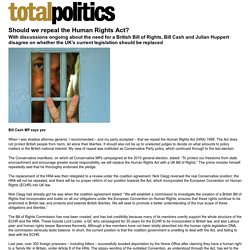
The Act does not protect British people from harm, let alone their liberties. It should also not be up to unelected judges to decide on what amounts to policy matters in the British national interest. My view of repeal was instituted as Conservative Party policy, which continued through to the last election. The Conservative manifesto, on which all Conservative MPs campaigned at the 2010 general election, stated: “To protect our freedoms from state encroachment and encourage greater social responsibility, we will replace the Human Rights Act with a UK Bill of Rights.” Lords v Commons: Tax credit battle gets constitutional. Image copyright Getty Images The government has been defeated in the House of Lords over its plans to cut tax credits in what is being described as a constitutional crisis.
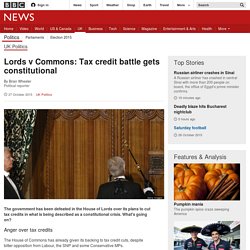
What's going on? What is the EU and when was it formed? Each of the countries within the Union are independent but they agree to trade under the agreements made between the nations.

Twenty two of the member states also belong to the Schengen Area, which is comprised of 26 European countries that have abolished passport and border controls at their common borders. Of the countries that are not part of it, Bulgaria, Croatia, Cyprus and Romania all intend to join, while the United Kingdom and Ireland have opted out. When was the European Union formed? After the Second World War there was a new movement to create unity between Germany and France, which would ultimately lay the foundations for the European Union four decades later. The EU can trace its origins from the European Coal and Steel Community (ECSC) and the European Economic Community (EEC), formed in 1951 and 1958 respectively by the Inner Six countries of Belgium, France, West Germany, Italy, Luxembourg and the Netherlands.
Michael Gove fails to mention Human Rights Act in Conservative Party Conference speech. For a Conservative Justice Secretary looking to fire up the faithful at the party conference there are three words that have always done trick: Human Rights Act. So it is all the more surprising that those were the three words that were noticeably absent from Michael Gove's speech to delegates in Manchester today. When he was appointed to the job by David Cameron after the election the Prime Minister made clear that scrapping the 'hated' legislation would be top of his new Justice Secretary's agenda. But the admirably independent Mr Gove has had other ideas. He wants to be a reforming Justice Secretary- but his plans for reform are rather different from those that his party might have hoped for. He wants to concentrate his energies on changing Britain's prison system: selling off outdated Victorian institutions; giving new powers to prison governors to innovate to cut reoffending and most importantly put eduction, training and skills at the heart of the prison system.
Vernon Bogdanor: The crisis of the constitution. It is hard to find a word held so low in the public esteem as “communalism”. For most people it carries a toxic whiff of both “communism” and “commune”, implying dropouts, flakes, fanatics and cultish leaders. If you’re in any doubt about how frightening the word is to the average citizen, try telling your next-door neighbour you’re going to live communally: they will veer away from you (believe me, I’ve done it), imagining drugs, sexual deviancy and squalor. Lord O’Donnell: leader of largest party does not automatically become PM. Gus O’Donnell, the former cabinet secretary, has reminded David Cameron that he signed up to a Whitehall document that says the next prime minister will be the leader who commands the confidence of MPs, regardless of whether their party has won the election.
In a sign of concerns in Whitehall that constitutional conventions should be followed if voters elect the most balanced parliament in nearly a century, Lord O’Donnell indicated that the leader of the largest party does not automatically become prime minister. O’Donnell spoke out after the Cameron accused Ed Miliband of preparing a “con trick” to enter No 10 with the support of the SNP. In an intensification of his warnings about the dangers of a post-election deal between Labour and the SNP, the prime minister said such an arrangement would raise huge questions about the credibility of that government.
O’Donnell told Today: “We live in a parliamentary democracy. English vote plan to become law despite objections - BBC News. English votes: What's going on? - BBC News. Image copyright PA The government is attempting to change the way MPs make laws to reflect the fact that the Scottish Parliament at Holyrood is getting more power. It is trying to solve a problem that has dogged Westminster for decades - why should Scottish (and sometimes Welsh and Northern Irish MPs) get a say over laws that only affect England when English MPs no longer have a say over an increasing tranche of areas - like schools. The solution it has come up with is a complex one, to anyone not steeped in the arcane procedures of the House of Commons.
And it is attracting criticism from all sides. Here's what is going on and why it matters.